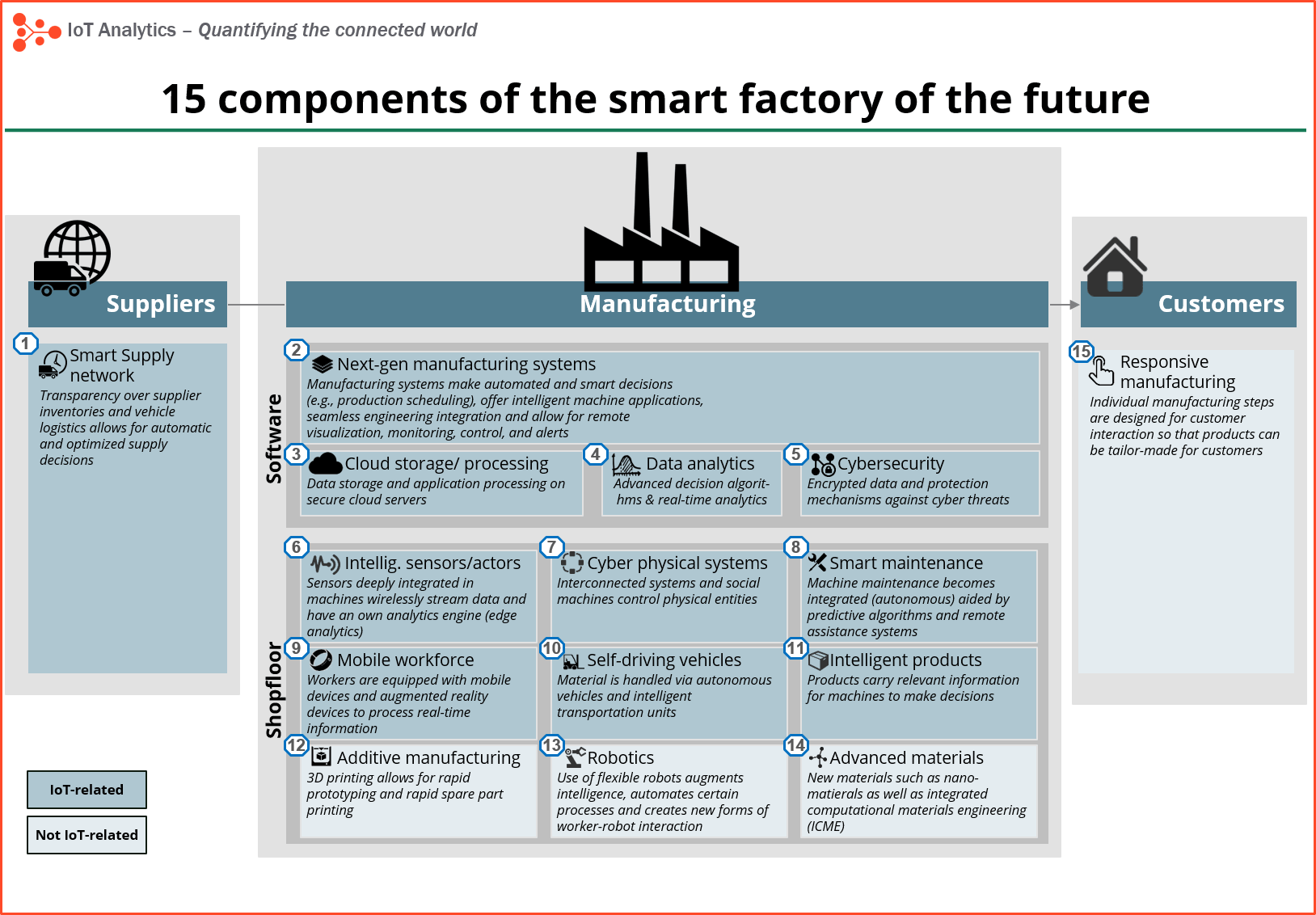Smart Manufacturing Technology

Smart manufacturing has been defined as the fully-integrated, collaborative manufacturing systems that respond in real time to meet changing demands and conditions in the smart factory, in the supply network, and in customer needs.Smart industry is a synonym for Industry 4.0 or industrial transformation in the fourth industrial revolution within which smart manufacturing de facto fits.
Smart manufacturing technology. Smart manufacturing is a broad category of manufacturing that employs computer-integrated manufacturing, high levels of adaptability and rapid design changes, digital information technology, and more flexible technical workforce training. Other goals sometimes include fast changes in production levels based on demand, optimization of the supply chain, efficient production and recyclability. A smart factory is a highly digitized and connected production facility that relies on smart manufacturing.Thought to be the so-called factory of the future and still in its infancy, the concept of the smart factory is considered an important outcome of the fourth industrial revolution, or Industry 4.0.. Used by manufacturing companies, a smart factory works by employing technology such as. EV+HEV. Engine electrification is at a rapid pace and driveline innovation must keep up with the demand. New challenges continually arise in this industry, challenges continually solved by SMT’s CAE solutions and expert innovation. Smart manufacturing technology is a combination of various technologies and solutions which collectively, if implemented in a manufacturing ecosystem. GE is estimated to have a major share in the.
The MarketWatch News Department was not involved in the creation of this content. Sep 09, 2020 (CDN Newswire via Comtex) -- The development prediction report titled Global Smart Manufacturing Technology Market 2020 by Company, Type and Application, Forecast to 2025 focuses on thoughtful insights and facts relating to the market. The report investigates the most... Based on these results, this research provides predictions regarding smart manufacturing technology and market maturity and technology correlation development, along with sample roadmaps for technology development, which could serve as a reference for government support and industry R&D. 3.1. Technology roadmap NIST supports smart manufacturing through many programs such as robotics in manufacturing, to support the closer integration of robotics and humans in industrial settings, and a digital thread testbed to evaluate the performance of automated in-process quality monitoring and control systems that are critical to the efficient operation of modern. Massachusetts Institute of Technology (MIT) is at the forefront of applied research and understands the factors that lead to successful implementation of smart technologies. From modeling to manufacturing systems to advanced data analytics, MIT draws on more than 100 years of university-industry collaboration.
SMART MANUFACTURING 9 8 CHAPTER 1 THE SMART MANUFACTURING WAVE Technology Converging Towards Smart Industry Notes: (1) Lonsdale, Joe, Man-Machine Symbiosis and The Smart Enterprise Wave (2) Schaeffer, Eric, Industry X.0 (3) McKinsey / Atluri, Venka et al., The trillion-dollar opportunity for the industrial sector: How to extract full value from. However, many organizations have already started investing and exploring the benefit from blockchain technology in manufacturing ecosystems. 6. The Importance of Industrial Robotics. The next thing that makes a typical manufacturing plant a smart manufacturing facility is the implementation of industrial robots. This post is the first installment (Part 1A) of six regarding the concept of Smart Manufacturing (SM). This series aims to inform manufacturers of SM’s components, how it affects business performance, economics and plans, its importance in the value chain, how it changes the workforce and the future of manufacturing overall. The Smart Manufacturing Innovation Institute, supported by the Advanced Manufacturing Office (AMO), will bring together over $140 million in public-private investment and a consortium of nearly 200 partners from across academia, industry, and non-profits, all with the goal of improving energy efficiency and productivity across U.S. manufacturing.
The company uses data-driven manufacturing technologies to help solve its customers' problems. They even integrate smart technology into their products. Benefits of Smart Manufacturing. Smart manufacturing builds upon itself. When everything is quantifiable, manufacturers gain real-time insights into shop-floor processes. The Smart Manufacturing Technology Program (SMTech) at Ohlone provides entry- level manufacturing technicians with the relevant knowledge and skills for Advanced Manufacturing in the 21st Century.The program provides students with knowledge and skills for Industry 4.0 standards, Industrial Internet of Things (IIoT), Additive Manufacturing, and emerging Manufacturing processes. Chartered with providing a new chapter to the latest road map, the smart manufacturing group identified technology enablers for building strong, agile and scalable electronics manufacturing. What is Smart Manufacturing? Smart Manufacturing is not a buzzword. Your competitors are taking advantage of it today. Integrating new Smart Manufacturing technologies can optimize your design-to-manufacturing process and help you create highly differentiated, cost-effective and competitive products that meet today’s market needs.
Improve Visibility into Costs, Efficiency, and Quality Across Factories. Oracle’s Smart Manufacturing solution provides a powerful set of tools for collecting operational data in real time, gleaning insights from the data, communicating rapidly, and making holistic and collaborative decisions at least at the same velocity (acting/reacting) or faster (predicting) as their business processes. Global Smart Manufacturing Technology Market Growth (Status and Outlook) 2020-2025. The report will make detailed analysis mainly on in-depth research on the development environment, Market size, development trend, operation situation and future development trend of Smart Manufacturing Technology Market on the basis of stating current situation of the industry in 2020. Advanced digital technology is transforming manufacturing in profound ways. Smart sensors, digital twins, the industrial internet of things (IIoT) and other technologies are swiftly changing the way products can be designed, manufactured, delivered and maintained. Technology Themes. Advanced Remanufacturing. Additive Manufacturing Industrialisation. Advanced Robotic Applications. Data-Driven Surface Enhancement. Intelligent Product Verification. Smart Manufacturing. Programmes. Model Factory @ ARTC. ROS-Industrial Consortium Asia Pacific. Smart Manufacturing Joint Lab. Hyper-Personalisation Line. News.
The Smart Manufacturing Innovation Platform™ (SMIP) is one of four strategic pillars of CESMII’s integrated strategy for democratizing and accelerating the adoption of Smart Manufacturing by small, medium and large manufacturers.. The SM Innovation platform is an environment that allows individual operational technology (OT) functional.



















